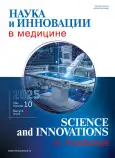Retrospective analysis of surgical outcomes of delayed pharyngeal defect reconstruction in patients with advanced laryngeal and laryngopharyngeal cancer after laryngectomy
- Authors: Kaganov O.I.1,2, Sidorenko A.O.1, Orlov A.E.1,2, Makhonin A.A.1,2, Gabrielyan A.G.1,2
-
Affiliations:
- Samara State Medical University
- Samara Regional Clinical Oncology Center
- Issue: Vol 10, No 2 (2025)
- Pages: 136-141
- Section: Oncology and radiotherapy
- URL: https://journal-vniispk.ru/2500-1388/article/view/316065
- DOI: https://doi.org/10.35693/SIM640925
- ID: 316065
Cite item
Abstract
Aim – to retrospectively analyze the results of surgical treatment of delayed reconstruction of pharyngeal defects in patients with advanced laryngeal and laryngopharyngeal cancer after laryngectomy.
Material and methods. We performed a retrospective analysis of 437 case histories of patients treated in Samara Regional Clinical Oncology Center in the period from 2015 to 2019 with malignant neoplasms of the larynx and laryngeal pharynx, who had previously undergone combined and extended-combined laryngectomies. In the retrospective analysis, we studied the structure of complications after delayed reconstructive surgeries of type 0-II pharyngeal and pharyngo-esophageal defects. Local tissue, pectoral flap, and deltopectoral flap were used as plastic material. Complications in the postoperative period were observed in all types of plasty.
Results. The most frequent complications included inflammation of the postoperative wound, anastomosis failure with subsequent formation of fistulas or secondary faryngostomas. In type 0 pharyngeal defects, plastic surgery with the use of local tissues showed a good result, postoperative complications occurred in 11% of cases. In I type pharyngeal defects, fistulas and secondary stomas in the postoperative period were formed in 83% of cases when local tissues were used, in 45.8% when pectoral flap was used and in 66.5% when deltopectoral flap was used. In type II of the defect, the percentage of postoperative complications when using a pectoral flap was 75% and deltopectoral flap – 100%.
Conclusion. Complications in the postoperative period were observed in all types of plasty. The study of risk factors and creation of the algorithm for selection of patients for delayed plasty will allow to determine the terms and indications for delayed reconstructive-reconstructive surgery, as well as to reasonably reduce the risk of postoperative complications.
Full Text
##article.viewOnOriginalSite##About the authors
Oleg I. Kaganov
Samara State Medical University; Samara Regional Clinical Oncology Center
Author for correspondence.
Email: o.i.kaganov@samsmu.ru
ORCID iD: 0000-0003-1765-6965
MD, Dr. Sci. (Medicine), Professor, the Head of the Department of Oncology, Deputy chief physician for scientific work
Russian Federation, Samara; SamaraAleksandra O. Sidorenko
Samara State Medical University
Email: alex11bahareva@gmail.com
ORCID iD: 0000-0002-4782-2912
MD, oncologist
Russian Federation, SamaraAndrei E. Orlov
Samara State Medical University; Samara Regional Clinical Oncology Center
Email: info@samaraonco.ru
ORCID iD: 0000-0003-3957-9526
MD, Dr. Sci. (Medicine), Chief physician, Professor of the Department of Healthcare Service Quality in the Institute of Postgraduate Education
Russian Federation, Samara; SamaraAleksandr A. Makhonin
Samara State Medical University; Samara Regional Clinical Oncology Center
Email: makhoninAA@samaraonko.ru
ORCID iD: 0000-0002-2182-5429
MD, Cand. Sci. (Medicine), assistant of the Department of Oncology, Head of the Oncology Department of Head and Neck Tumors
Russian Federation, Samara; SamaraAleksei G. Gabrielyan
Samara State Medical University; Samara Regional Clinical Oncology Center
Email: Gabriel_002@mail.ru
ORCID iD: 0009-0006-7640-4847
MD, Cand. Sci. (Medicine), assistant of the Department of Dentistry of the IPE, physician maxillofacial surgeon
Russian Federation, Samara; SamaraReferences
- Malignant neoplasms in Russia in 2022 (morbidity and mortality). Eds. Kaprin A.D., Starinsky V.V., Petrova G.V. M., 2022. (In Russ.). [Злокачественные новообразования в России в 2022 году (заболеваемость и смертность). Под ред. Каприна А.Д., Старинского В.В., Петровой Г.В. М., 2022].
- State of Cancer Care in Russia in 2022. Eds. Kaprin A.D., Starinsky V.V., Petrova G.V. M., 2022. (In Russ.). [Состояние онкологической помощи населению России в 2022 году. Под ред. Каприна А.Д., Старинского В.В., Петровой Г.В. М., 2022].
- Marzouki H, Addas MA, Nujoom M, et al. Hypopharyngeal Reconstruction: Possibilities, Outcomes, and Updates for Improving the Human Health for Quality of Life. Comput Intell Neurosci. 2022;2022:6132481. doi: 10.1155/2022/6132481
- Alfouzan AF. Review of surgical resection and reconstruction in head and neck cancer: traditional versus current concepts. Saudi Medical Journal. 2018;39(10):971-980. doi: 10.15537/smj.2018.10.22887
- Yabe T, Ashford B. Reconstruction of Pharyngeal Defects. IntechOpen. Published: 19 October 2020. doi: 10.5772/intechopen.87598
- Ratushny MV, Reshetov IV, Polyakov AP, et al. Reconstructive operations on the pharynx in cancer patients. P.A. Herzen Journal of Oncology. 2015;4(4):57-63. [Ратушный М.В., Решетов И.В., Поляков А.П., и др. Реконструктивные операции на глотке у онкологических больных. Онкология. Журнал им. П.А. Герцена. 2015;4(4):57-63.]. doi: 10.17116/onkolog20154457-63
- Clark JR, Gilbert R, Irish J, et al. Morbidity after flap reconstruction of hypopharyngeal defects. Laryngoscope. 2006;116(2):173-81. doi: 10.1097/01.mlg.0000191459.40059.fd
- Denewer A, Khater A, Hafez MT, et al. Pharyngoesophageal reconstruction after resection of hypopharyngeal carcinoma: a new algorithm after analysis of 142 cases. World J Surg Onc. 2014;12:182. doi: 10.1186/1477-7819-12-182
- Nouraei SA, Mace AD, Middleton SE, et al. A stratified analysis of the perioperative outcome of 17623 patients undergoing major head and neck cancer surgery in England over 10 years: Towards an Informatics-based Outcomes Surveillance Framework. Clin Otolaryngol. 2017;42(1):11-28. doi: 10.1111/coa.12649
- Süslü N, Şefik Hoşal A. Early oral feeding after total laryngectomy: Outcome of 602 patients in one cancer center. Auris Nasus Larynx. 2016:43:546-550. doi: 10.1016/j.anl.2016.01.004
- Yeh DH, Sahovaler A, Fung K. Reconstruction after salvage laryngectomy. Oral Oncology. 2017;75:22-27. doi: 10.1016/j.oraloncology.2017.10.009
- Cunha S, Zenha H, Santos D, et al. Microsurgical reconstruction of pharyngoesophageal defects – case series and critical review of the literature. Eur J Plast Surg. 2018;41(1):147-156. doi: 10.1007/s00238-017-1335-6
- Piazza C, Del Bon F, Paderno A. Fasciocutaneous free flaps for reconstruction of hypopharyngeal defects. Laryngoscope. 2017;127(12):2731-2737. doi: 10.1002/lary.26705
- Cannon RB, Houlton JJ, Mendez E, Futran ND. Methods to reduce postoperative surgical site infections after head and neck oncology surgery. Lancet Oncology. 2017;18(7):e405-e413. doi: 10.1016/S1470-2045(17)30375-3
Supplementary files












